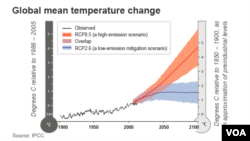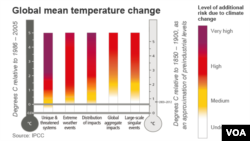A U.N. panel said humans are interfering with the Earth's climate, and that the effects touch every continent and the planet's oceans.
In a new report released Monday, the Intergovernmental Panel on Climate Change highlighted the risks of a warming planet and said that in many cases the world is not well prepared.
Chris Field, a co-chair of the panel, said people and ecosystems around the world are already vulnerable.
"One of the most important findings is that we are not in the era where climate change is some kind of a future hypothetical. We live in a world where impacts of climate changes that have already occurred are widespread and consequential. We see impacts from the equators to the poles, and from the coast to the mountains. There is no question that we live in the world that already altered by climate change," said Field.
The report said the effects already observed include impacts on agriculture, human health, water supplies, and on both land and sea ecosystems. It says the more the planet warms, the greater the chance for severe impacts that may be irreversible.
Rajendra Pachauri, who heads the panel, stressed the wide-ranging nature of those impacts.
"We have assessed impacts as they are happening, and impacts on natural and human systems on all continents and oceans. And I would like to emphasize that, in view of these impacts and those that we have projected for the future, nobody on this planet is going to be untouched by the impacts of climate change," said Pachauri.
The report said the impacts of recent natural disasters have shown how countries "at all levels" lack preparedness for variability in climate, and advised governments to develop plans to adapt to climate change and to incorporate those policies into their broader development plans.
The panel cautioned that uncertainty about how severe the impacts will be and when they will hit make that planning more difficult to carry out, and that there is no single approach that is appropriate for dealing with risks across the planet.
It also highlighted the benefits of national and local governments working together to complement each other's actions, as well as the gains that can be found if cooperation stretches within and across regions.
The report said some of the risks are "considerable" if global temperatures rise to one or two degrees Celsius above pre-industrial levels.
The World Meteorological Organization is one of the U.N. organizations that set up the climate panel in the 1980s. It reported last week that 2013 was the sixth warmest year on record, and that 13 of the 14 warmest years on record have all happened this century.
U.S. Secretary of State John Kerry said in a statement that the world needs to act "dramatically and quickly" or else our way of life will be in jeopardy. He said no one country caused climate change or can stop it, and that the costs of not acting are "catastrophic." The report Monday specifies a number of impacts for each region of the world for which scientists have "high confidence" will happen with a warming planet.
In Africa, the report predicted, warming will put greater stresses on water resources.
For Europe, the risks include increased flooding along coasts and river basins with economic impacts, as well as more restrictions on water.
It said Asia is at higher risk of heat-related deaths, along with water and food shortages brought on by droughts.
In North America, the panel also highlighted the effects of a warmer, drier climate, with increased risk of wildfires and deaths from the heat. It said urban flooding is also a concern.
Flooding is a risk for Central and South America, as well as the world's small islands. In both the Americas and Africa. The panel said there is a threat for the spread of so-called vector-borne diseases, which include things like malaria and Dengue fever.
The panel said overall risks would be substantially reduced if the rate and magnitude of any climate change is limited.
The report brings together contributions from hundreds of people in 70 countries.
The panel was the co-recipient of the 2007 Nobel Peace Prize for what the Nobel committee said was its efforts to "build up and disseminate greater knowledge about man-made climate change."
In a new report released Monday, the Intergovernmental Panel on Climate Change highlighted the risks of a warming planet and said that in many cases the world is not well prepared.
Chris Field, a co-chair of the panel, said people and ecosystems around the world are already vulnerable.
"One of the most important findings is that we are not in the era where climate change is some kind of a future hypothetical. We live in a world where impacts of climate changes that have already occurred are widespread and consequential. We see impacts from the equators to the poles, and from the coast to the mountains. There is no question that we live in the world that already altered by climate change," said Field.
The report said the effects already observed include impacts on agriculture, human health, water supplies, and on both land and sea ecosystems. It says the more the planet warms, the greater the chance for severe impacts that may be irreversible.
Rajendra Pachauri, who heads the panel, stressed the wide-ranging nature of those impacts.
"We have assessed impacts as they are happening, and impacts on natural and human systems on all continents and oceans. And I would like to emphasize that, in view of these impacts and those that we have projected for the future, nobody on this planet is going to be untouched by the impacts of climate change," said Pachauri.
The report said the impacts of recent natural disasters have shown how countries "at all levels" lack preparedness for variability in climate, and advised governments to develop plans to adapt to climate change and to incorporate those policies into their broader development plans.
The panel cautioned that uncertainty about how severe the impacts will be and when they will hit make that planning more difficult to carry out, and that there is no single approach that is appropriate for dealing with risks across the planet.
It also highlighted the benefits of national and local governments working together to complement each other's actions, as well as the gains that can be found if cooperation stretches within and across regions.
The report said some of the risks are "considerable" if global temperatures rise to one or two degrees Celsius above pre-industrial levels.
The World Meteorological Organization is one of the U.N. organizations that set up the climate panel in the 1980s. It reported last week that 2013 was the sixth warmest year on record, and that 13 of the 14 warmest years on record have all happened this century.
U.S. Secretary of State John Kerry said in a statement that the world needs to act "dramatically and quickly" or else our way of life will be in jeopardy. He said no one country caused climate change or can stop it, and that the costs of not acting are "catastrophic." The report Monday specifies a number of impacts for each region of the world for which scientists have "high confidence" will happen with a warming planet.
In Africa, the report predicted, warming will put greater stresses on water resources.
For Europe, the risks include increased flooding along coasts and river basins with economic impacts, as well as more restrictions on water.
It said Asia is at higher risk of heat-related deaths, along with water and food shortages brought on by droughts.
In North America, the panel also highlighted the effects of a warmer, drier climate, with increased risk of wildfires and deaths from the heat. It said urban flooding is also a concern.
Flooding is a risk for Central and South America, as well as the world's small islands. In both the Americas and Africa. The panel said there is a threat for the spread of so-called vector-borne diseases, which include things like malaria and Dengue fever.
The panel said overall risks would be substantially reduced if the rate and magnitude of any climate change is limited.
The report brings together contributions from hundreds of people in 70 countries.
The panel was the co-recipient of the 2007 Nobel Peace Prize for what the Nobel committee said was its efforts to "build up and disseminate greater knowledge about man-made climate change."














